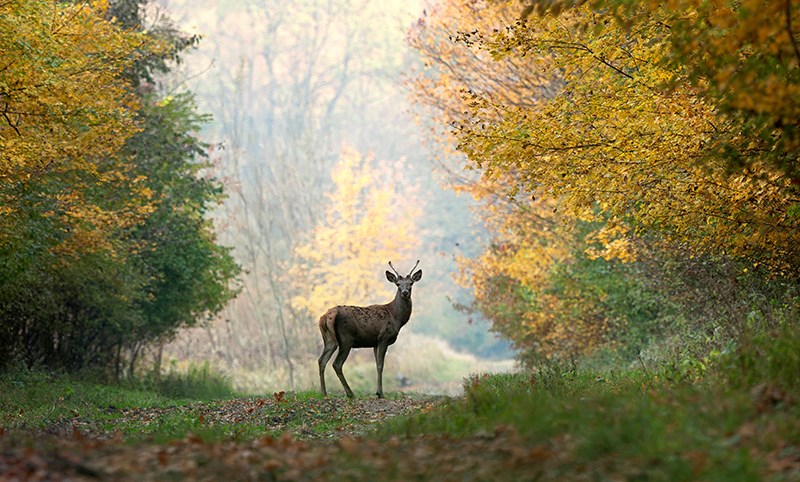Details of changes to a Texada Island Airport plan to cull deer in order to improve public safety at the runway is not sitting well with some island residents.
Texada resident Chuck Childress, a member of the Texada Airport advisory committee for Powell River Regional District, said that he has concerns about how an escalation to the plan was established and how it will be carried out.
Texada airport manager Valerie Ferguson said she notified the committee in mid-October, before its scheduled meeting in November, in order to let the community know that she was making some operational changes to the airport’s wildlife-management plan.
“Deer on the runway is a public safety issue,” said Ferguson. “The immediate priority is to keep the runway clear of the deer. We'll do whatever it takes.”
Ferguson sent out an email to the committee’s chair saying that the airport has “a serious deer problem” and that a regional district manager has permission to hunt on the airport's property.
“I didn't like how it happened,” said Childress. “It happened before the advisory committee meeting and before any public meeting on Texada.”
According to Ferguson’s correspondence to the advisory committee chair, the airport is “currently only able to take one deer on the wildlife permit” it was issued, however, if conditional permission were granted to regional district manager of operational services Shawn Gullette, he would be about to use his own deer tags as “a valid option of control.”
Ferguson said that Gullette was chosen because he has the right certifications and training to be discharging a gun at the airport.
Childress said giving Gullette the permission to hunt at the airport, when no one else is legally permitted to, is akin to providing him with his own private hunting reserve.
According to Ferguson, since providing the conditional permission, Gullette has yet to be asked to shoot any deer.
“Because hunting season is in full swing, the deer have been scared off the airport,” said Ferguson. “Hopefully, we won't have to use any management technique for a while.”
Gullette said the issue has quickly turned into a public-perception issue for the regional district.
“As far as I know, it's been put on hold indefinitely," he said.
Ferguson did confirm that if need arises again, she will call Gullette.
Texada is a destination for deer hunters in the province, with its higher bag limit and longer hunting season due to its lack of predators and growing mule-deer population.
The airport, located northeast of the village of Gillies Bay in central Texada, is surrounded by managed forest and Lafarge Canada Texada Quarrying property, which is off-limits for hunters.
The 40-acre unfenced airport grassland is a considerable attractant for the deer, said Ferguson.
All airports, even ones that have been decertified, are required by Transport Canada to have a wildlife-management plan and, according to federal guidelines, the plan should set out escalating tactics to remove the threat of bird and mammal strikes by aircraft.
Ferguson explained that before a flight lands or takes off, airport staff drive out wildlife and chase them off of the runway. Once they have become accustomed to that, staff will start chasing them with a truck horn blaring.
“That will scare them for a little while,” she said, "then once they don't move for that, you chase them and throw bear bangers.”
Ferguson said once loud noises become ineffective, staff are then at the point when they consider “using a lethal solution.”
Childress, who has a long history of involvement in local island politics as chair of Texada Action Now Community Association, said he would have preferred to have the regional district give the community an opportunity to have a town hall meeting where ideas could be gathered and then the advisory committee could make a recommendation.
“That would have been the proper way to handle it,” he said.
Childress said he is against killing deer because it is a human-created problem and it is not the fault of the deer.
“This is not the way to do wildlife management,” he said.
Ferguson said Transport Canada recognizes that killing wildlife can be unsavoury to some people, but the public needs to understand that deer strikes are considered one of the main safety issues for airports.
“It is recommended by Transport Canada that killing is the immediate and short-term solution,” she said. “You'll find this in every airport wildlife plan.”
Powell River Regional District Electoral Area D board director Sandy McCormick said the issue of killing the deer has been controversial on the island and has yet to be resolved.
"If you shoot a deer, 10 more arrive the next day," said McCormick. "What they are doing now does not solve the problem.”
McCormick said she would prefer to see a fence erected to keep the deer out.
Regional district chief administrative officer Al Radke said there has been discussions about fencing the area, but the conversation usually stops when the cost of the fencing comes up.
Radke said Texada taxpayers, who pay for the airport, would be paying several thousand dollars for the fencing because of the height and length required to enclose the whole airport.
McCormick said she does not see why the regional district could not seek out provincial grant funding.
"There are options out there for funding streams for a fence," said McCormick. “I believe it would be prudent to go that route, which would solve the problem.”



